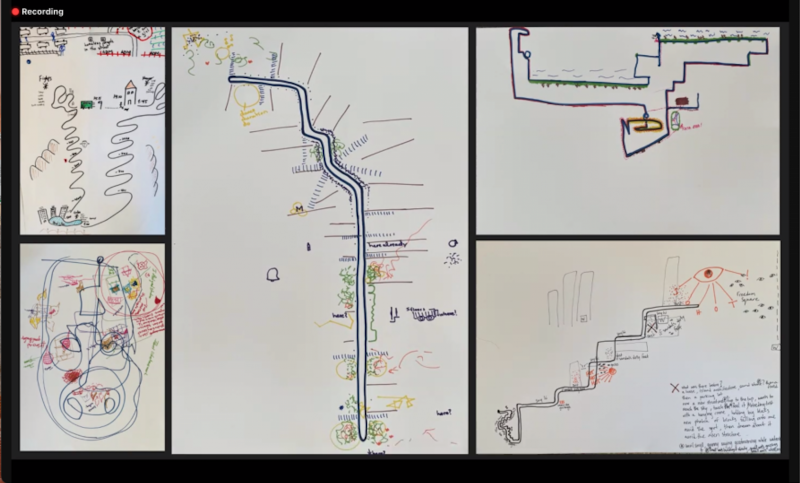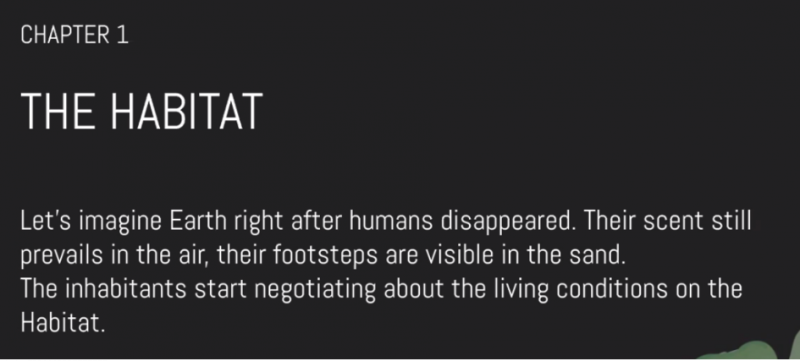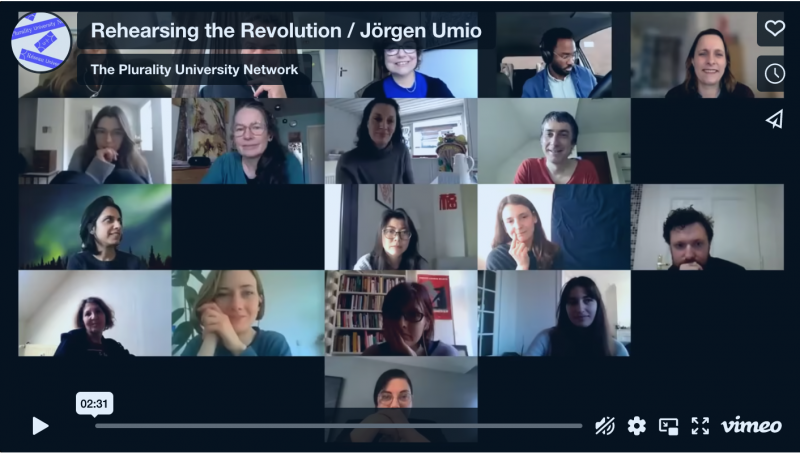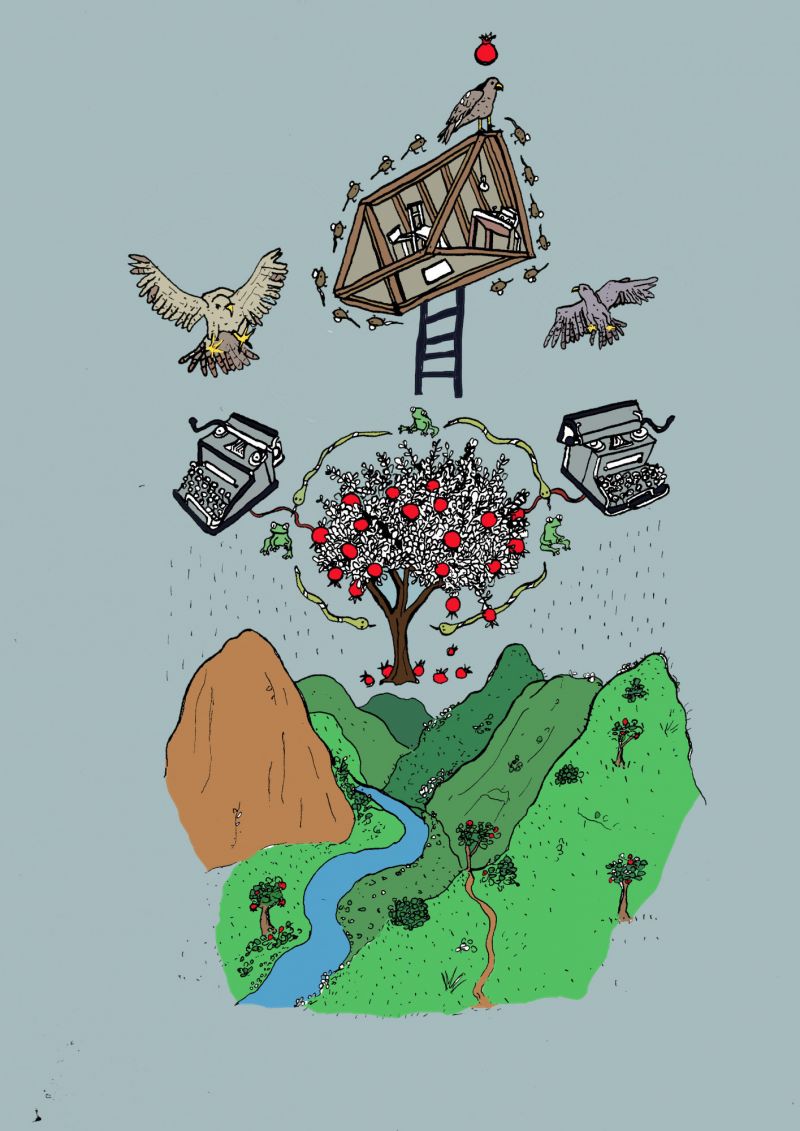“Draw the route that you’ve traveled most in your childhood”, asks Petra Ardai, the ‘theatre-maker’ at the source of SPACE and its latest project ‘Rehearsing the Revolution: storytelling for common ground dialogues’.
“Where is that road?” - participants respond with Paris, Montreal, Budapest, or a village in Greece, France, Poland…
“Add five objects that you remember along this road: an animal, a machine, a plant, a landscape, a natural phenomenon”. A cloud of words emerges: a bike, a zebulon dog, a flooded road, a monster rabbit…

This initial stage of the game serves two purposes: to reconnect participants with their past as a foundation to think about very different futures, and to create a personal connection among the participants.
Imagine earth without humans
Then we break into five small groups, and are introduced to the story we are to tell: “Imagine Earth without us, humans. What does the planet look like? How do nature, organic and synthetic entities develop and regenerate without us? What happens to the traces and the memory of mankind? What if, after a few million years, the conditions become optimal and a new species in the lineage of humans occur? How does this offspring relate to other sentient beings and the surrounding? Can Earth teach the descendents to become kin?”
Each group represents one character: a pomegranate tree, a typewriter, heavy rain, a river valley, a falcon. The poet and songwriter Jörgen Unom Gario takes us through the four stages of the story we will imagine through the eyes of our character.

In “The Habitat”, we imagine earth after the humans, from our character’s point of view. We describe what each of us need to thrive. The valley likes to welcome visitors on the rare occasions when it’s not dry. The tree has learned to hoard water and live in symbiosis with other animals, however the falcon needs prey. The typewriter requires cover in a human ruin, but also someone, or something, to write on it… How can all entities live together in the same space? Negotiations begin. Could falcons become vegetarian? Answer: no. Could they eat the mice that live with the typewriter in the ruined attic, and are learning to type in their own way?
In the next chapter, “Daily Existence”, the inhabitants learn to know each other and reflect on their existence without humans. Relief coexists with nostalgia. Falcons liked to partner with them in hunting, trees enjoyed teaching patience to humans, nobody mends the river banks after the floods, but nobody creates dams upstream, too… We learn that one resource is essential to all: water.
Negotiating for coexistence
In “The Decline”, thousands of years have passed, all inhabitants have evolved in different directions, and coexistence has become difficult. Who is to blame? We start looking for scapegoats. The rain blames itself for acting randomly, sometimes too scarce, sometimes too abundant. The river valley doesn’t like the tree’s tendency to organize everything and everyone around it. Most everyone blames the falcon for caring only about its own needs and blabbering all the time, while the tree finds everyone else too noisy.
Finally, “Revolution”! To save their common habitat, its inhabitants need to make decisions and start a radical change. Luckily, millenia of evolution has allowed the mice to type (using ink from the tree’s fruits), and their writings start the revolution.
Time has flown for the participants as well. Jörgen weaves their stories into one poetic narrative.

Finding common ground
Reflecting on the workshop, Petra explains: “Rehearsing the Revolution is a storytelling game, in which we can experience reality from different perspectives and truths, and by doing that, discover what connects us”. “In Rehearsing the Revolution we want to learn to listen to the voice of the other, to the voice of people but also to other forms of life such as the animals, flora and landscapes around us. We want to develop a new way of dialogue that helps us to have the courage to think in terms of connectedness rather than separation.”
SPACE focuses on polarized areas and situations: Roms in Hungary, the contested zones between Greece and Turkey in Cyprus, refugees in the Netherlands… Its goal is to use co-created stories in order to change reality, because “reality is made up of stories”: by changing the stories together, participants find common ground and realize that they can also change their common reality.

This online agora took place on February 7, 2022, as part of Narratopia’s ‘Collective Practices’ project. It was organized by the Plurality University Network and SPACE, and facilitated by Jorgen Unom Gario (instant poetry), Petra Ardai (storytelling) and Esther Verhamme (online storytelling).
Article written by Daniel Kaplan